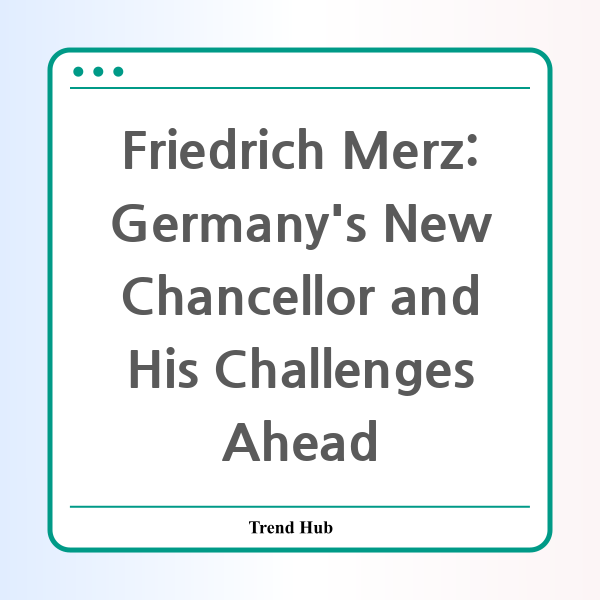* This website participates in the Amazon Affiliate Program and earns from qualifying purchases.

As the political landscape of Europe continues to shift, Germany prepares for a significant transformation under the leadership of Friedrich Merz, the newly appointed Chancellor. With the world watching closely, Merz is stepping into his role during a period of unprecedented economic and geopolitical challenges. Will he be able to restore confidence in Germany’s political center and navigate the brewing storm of far-right politics?
Merz, from the Christian Democratic Union (CDU), has been designated as the new Chancellor of Germany, a position that many analysts believe carries immense responsibility at a critical juncture in Europe. With a coalition formed between the conservatives and the center-left Social Democrats, this government represents an attempt to unify Germany after a series of political upheavals. Following the collapse of the previous coalition led by Chancellor Olaf Scholz, Merz is tasked with not only stabilizing the government but also revitalizing the economy, which has been grappling with its longest downturn since World War II.
The economic challenges augur serious implications for Germany and the European Union at large. Following the full-scale invasion of Ukraine in 2022, Germany has faced the double whammy of losing access to affordable Russian gas and contending with a global trade war exacerbated by rising tariffs. Analysts are questioning whether Merz can effectively manage these crises, particularly as he reinforces Germany's commitment to supporting Ukraine and increasing military spending amid wavering support from the U.S. under the current geopolitical climate.
What sets Merz apart from previous leaders is his business-savvy approach. Having spent many years in the private sector, including a notable stint as a chairman of BlackRock Germany, Merz brings a different style to the chancellery—markedly more provocative and economically liberal than his predecessor, Angela Merkel. This shift could reflect a broader desire within the German electorate for a return to right-leaning policies and fiscal responsibility.
However, Merz is not without his critics. A significant concern arises from his controversial decision to align with the far-right Alternative for Germany (AfD) on an anti-migration motion, which some argue risks legitimizing extreme right politics in the country. This decision has the potential to boost support for the AfD and other far-left parties, posing a serious threat to the stability of Germany's political center.
With fresh cabinet appointments, Merz aims to inject new energy into his government, focusing on expertise over established political capital. Yet, many remain skeptical. Carsten Brzeski, a macroeconomic expert, points out that Merz’s past hesitations about fiscal policies raise critical questions about his long-term vision for Germany's economy. There is a pressing need for the new government to restore trust among the electorate; failure to do so may lead to increasing support for the AfD in future elections.
In conclusion, as Friedrich Merz prepares to take the oath of office, the weight of expectation and the challenges ahead are immense. His ability to navigate through economic turmoil, geopolitical uncertainty, and the threat of far-right populism will undoubtedly define his chancellorship and the future of Germany in Europe. The world will be watching as Merz embarks on this pivotal journey to lead one of Europe’s most influential nations.
* This website participates in the Amazon Affiliate Program and earns from qualifying purchases.